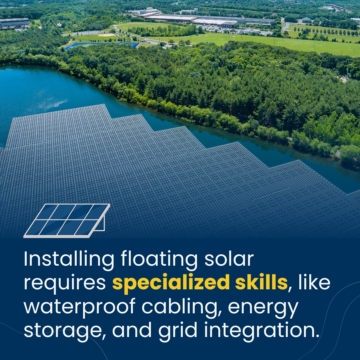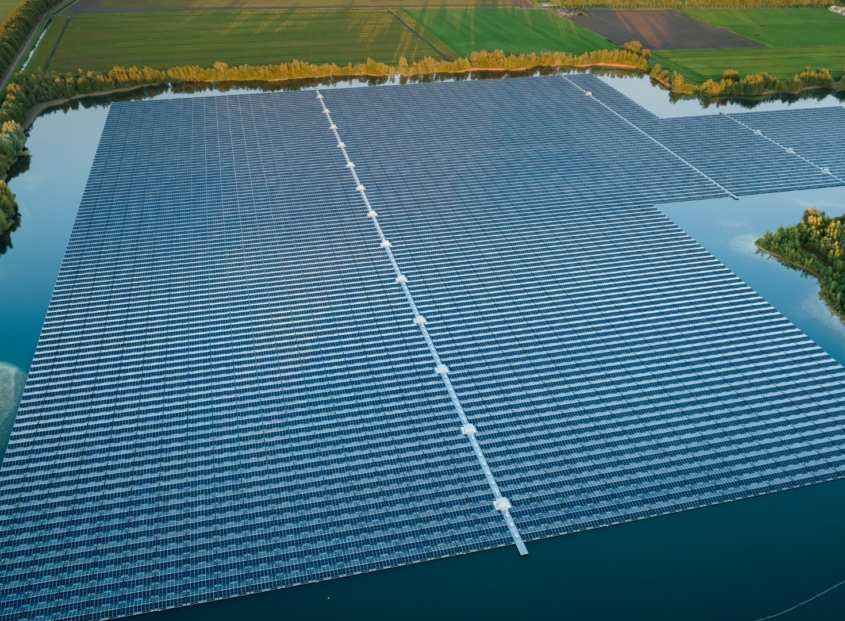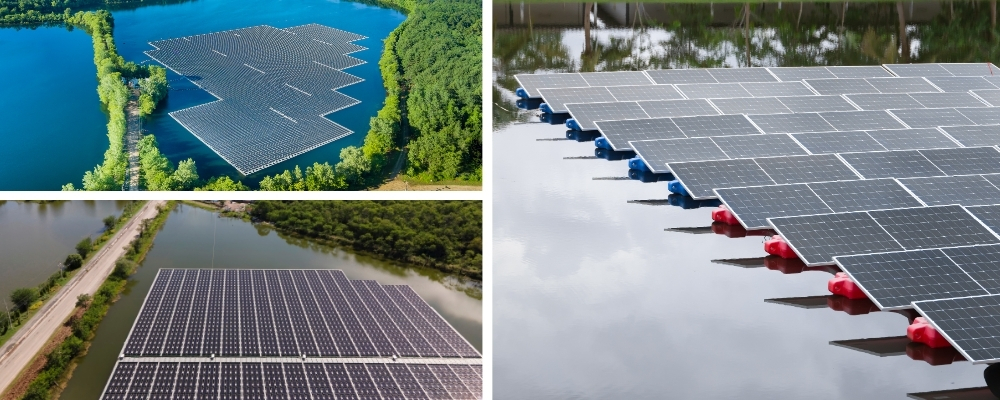America’s Floating Solar Future: What You Need to Know
The renewable energy sector is booming, and new technologies like floating solar panels are opening up exciting opportunities for electricians and contractors. This emerging technology could revolutionize America’s solar capacity, creating significant opportunities for contractors to grow with the green economy. The potential for growth in the renewable energy sector is immense, and it’s an exciting time to be part of this industry.
What is Floating Solar?
The solar industry has grown significantly over recent years. While most people are familiar with land-based infrastructure, solar technology now rides new waves.
Floating solar panels are installed on bodies of water using pontoons or floats. The panels sit above the water and utilize similar PV technology to produce energy like land-based options. However, what makes them particularly intriguing are their unique advantages, which set them apart from traditional solar panels and make them a compelling choice for the future of renewable energy. Let’s explore these advantages in more detail.
- Space-saving: Floating solar systems require much less land area compared to ground-mounted solar farms, which is especially valuable in regions where land is scarce or expensive.
- Improved energy efficiency: Water helps cool the solar panels, which enhances their efficiency and performance.
- Water conservation: The panels act as a barrier to reduce evaporation from water bodies, a major benefit in drought-prone areas. Floating solar panels help preserve vital water resources while simultaneously generating clean energy.
Floating Solar Promises Incredible Commercial Growth
Companies and communities focused on renewable energy initiatives can benefit from incorporating floating solar options. One of the most promising developments is a recent study that found solar panel installation on federally controlled water reservoirs could generate up to 1,042 gigawatts of power—enough to power 100 million homes.
These stats show floating solar’s vast potential. U.S. reservoirs alone could generate much-needed energy via solar power, underscored by the massive opportunity for commercial growth in renewable energy through floating solar solutions.
How Does Floating Solar Affect Electricians & Contractors?
Floating solar isn’t just a novel concept—it’s a practical solution already being implemented. For example, the U.S. Army at Fort Liberty partnered with Ameresco to develop a floating solar project to enhance energy resilience. The plan is to use two acres of water at Big Muddy Lake at Camp Mackall for the solar installation, which includes:
- 1.1 MW floating solar PV system with an on-site renewable energy generation
- 2 MW / 2 MWh battery energy storage system
- Boiler, HVAC, and lighting system upgrades
- Necessary water conservation systems
This is just one of many examples of floating solar being put into action, proving its viability and potential. This creates a major opportunity for electricians and contractors who understand the technology.
Installing floating solar systems requires specialized electrical knowledge, including working with waterproof cabling, energy storage systems, and complex grid integrations. As utilities and municipalities invest in water-based solar installations, electrical professionals with this expertise will be in high demand.
A New Frontier for Energy Careers
The floating solar market in the U.S. is still in its early stages, but its potential is massive. This expansion means more jobs, contracts, and opportunities to shape the future of energy.
Now is the time for electricians and contractors to position themselves for success in the renewable energy market. Understanding the fundamentals of floating solar technology—its design, installation, and integration—can open doors to projects shaping the next generation of energy infrastructure.
Discover NECA–IBEW Local 48
The NECA–IBEW Local 48 partnership has been integral to Oregon and Southwest Washington’s electrical industry for over a century. Check out our membership page to learn more.
SIGN UP FOR OUR NEWSLETTER



